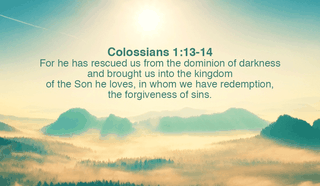
- Recent Translations
- All Translations
Colossians 1:18
Share
Settings
Colossians 1:18 Meaning and Commentary
And he is the head of the body, the church
By "the church" is meant, not any particular congregated church, as the church at Colosse, or Corinth, or any other; but the whole election of grace, the general assembly and church of the firstborn, whose names are written in heaven in the Lamb's book of life; the church which Christ has given himself for, and has purchased with his blood, and builds on himself the rock, and will, at last, present to himself a glorious church without spot or wrinkle, or any such thing; this is compared to an human body, and therefore called "the body"; which is but one, consisting of many members in union with each other, set in their proper places in just symmetry and proportion to each other, and subservient to one another, and are neither more nor fewer; see ( 1 Corinthians 12:12-14 ) and of this body, the church, Christ is "the head"; he was the representative head of this body of elect men from all eternity, and in time; he is a political head of them, or in such sense an head unto them, as a king is to his subjects; he reigns in them by his Spirit and grace, and rules them by wholesome laws of his own enacting, and which he inscribes on their hearts, and he protects and defends them by his power; he is an economical head, or in such sense an head of them, as the husband is the head of the wife, and parents and masters are the heads of their families, he standing in all these relations to them; and he is to them what a natural head is to an human body; of all which (See Gill on 1 Corinthians 11:3). The Messiah is called one head, in ( Hosea 1:11 ) ; which Jarchi explains by David their king, and Kimchi on the place says, this is the King Messiah:
who is the beginning;
which either denotes the eternity of Christ, who was not only in the beginning, and was set up from the beginning, from everlasting, but is also the beginning and the end; and who is, indeed, without beginning of days, or end of life: or his dominion; he is the principality, as the word may be rendered; he is the principality of principalities, the head of all principality and power, the angels; he is the Prince of the kings of the earth; he is King of saints; the kingdom of nature and providence is his, and the government of his people in a special manner is on his shoulders: or this may design his being the first cause of all things; he is the beginning of the creation of God; the efficient cause of all created beings; he is the beginning of the church, of which he is the head; as Eve was from Adam, so is the church from Christ; it is a body of his preparing, and a temple of his building, and where he sits as a priest on his throne, and has the government of it: the second number, wisdom, in the cabalistic tree of the Jews, is called "the beginning" F14, as is the Logos, or Word, by Philo the Jew F15:
the firstborn from the dead;
the first that rose from the dead by his own power, and to an immortal life; for, though others were raised before him, and by him, yet not to a state of immortality; the path of life, to an immortal life, was first shown to him as man; and who also is the firstfruits of them that sleep, and so the pledge and earnest of the future resurrection of the saints; and is both the efficient and exemplary cause of it; the resurrection of the dead will be by him as God, and according to his own, as man:
that in all [things] he might have the pre-eminence;
or might be the first and chief over all persons, angels, and men; having a superior nature, name, and place, than the former, and being the firstborn among many brethren designed by the latter: and in all things he is the first, and has the precedence and primacy; in sonship, no one is a Son in the sense he is; in election, he was chosen first, and his people in him; in the covenant, he is the surety, Mediator, and messenger of it, he is that itself; in his human nature, he is fairer than the children of men; in redemption, he was alone, and wrought it out himself; in life, he exceeded all others in purity, in doctrine, and miracles; and in dying he conquered death, and rose first from it; in short, he died, revived, and rose again, that he might be Lord both of dead and living; and he ought to have the pre-eminence and first place in the affections of our hearts, in the contemplations of our minds, in the desires of our souls, and in the highest praises of our lips.
F14 Cabala denudata, par. 2. p. 7. & Lex. Cabal. p. 679, 681.
F15 Philo de Conf. ling. p. 341.

